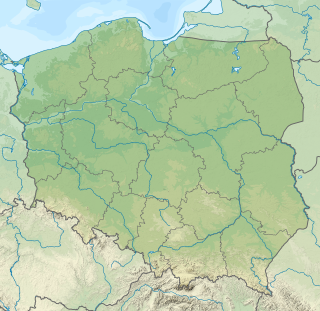
Coal in Poland is partly mined and partly imported. 144 million metric tons of coal was mined in 2012, providing 55 percent of that country's primary energy consumption. Poland is the second-largest coal-mining country in Europe, after Germany, and the ninth-largest coal producer in the world. The country consumes nearly all the coal it mines, and is no longer a major coal exporter.[1]
Coal mines are concentrated mainly in Upper Silesia. The most profitable mines were Marcel Coal Mine and Zofiówka Coal Mine. In communist times (1945–1989) one of the most important and largest mines was 1 Maja Coal Mine.
In 2020, coal played a significant role in Poland's energy mix, making up 69.5% of the nation's energy production and 68.5% of its electricity generation. It accounted for 40.2% of the Total Energy Supply (TES). The largest portion of coal consumption was in electricity and heat generation, representing 75.6% of the total demand. The industrial sector followed, utilizing 14.5%, and buildings were responsible for 9.9% of coal usage.[2]

In 2023 over 60% of Poland's electricity was generated from coal.[3] However extraction is becoming increasingly difficult and expensive, and has become uncompetitive against Russian imports, which are cheaper and of higher quality.[4] The industry now relies on government subsidies, taking nearly all of the annual €1.6 billion government energy sector support. In September 2020, the government and mining union agreed a plan to phase out coal by 2049,[5] but this has been criticised by environmentalists as too late to be compatible with the Paris Agreement to limit climate change.[6]
As of early 2022, Poland imported roughly a fifth of its coal, with 75% of these imports coming from Russia.[7] In late March 2022, Poland's government announced that it would ban Russian coal imports due to the 2022 Russian invasion of Ukraine, with imports from Russia to cease entirely by April or May 2022.[8][9] The effectiveness of this decision has been questioned as any trade ban would be likely to contravene European Union (EU) rules because the vast majority of Russian coal is imported by private companies.[10] The Polish government has not outlined plans on how it will replace Russian imports (which stood at 8.3 mln tons or around 66% of all coal imported to Poland in 2021[10]) or deal with reduced coal supply. Russia's Ministry of Energy expressed doubt that Poland would be able to rapidly replace Russian coal.[11]
- ^ US Energy Information Administration Poland overview, Sept 2013
- ^ Cite error: The named reference
:0was invoked but never defined (see the help page). - ^ Ptak, Alicja (2024-01-03). "Poland produced record 26% of electricity from renewables in 2023". Notes From Poland. Retrieved 2024-01-04.
- ^ "As Pressures Mount, Poland's Once-Mighty Coal Industry Is in Retreat". Yale E360. Retrieved 2022-03-30.
- ^ Gatten, Emma; Suszko, Agnieszka (22 October 2020). "Can Poland, the dirty man of Europe, end its love affair with coal?". The Daily Telegraph. Retrieved 23 October 2020.
- ^ "Remaining EU Coal Power Polluters". Ember. Retrieved 2021-12-20.
- ^ "Poland to ban Russian coal imports". POLITICO. 2022-03-29. Retrieved 2022-03-30.
- ^ "Премьер Польши назвал сроки полного отказа от угля из России". РБК (in Russian). 30 March 2022. Retrieved 2022-03-30.
- ^ "Poland moves to block coal imports from Russia". AP NEWS. 2022-03-29. Retrieved 2022-03-30.
- ^ a b Tilles, Daniel (2022-03-29). "Poland to ban Russian coal imports, saying it "can't wait any longer for EU to act"". Notes From Poland. Retrieved 2022-03-30.
- ^ "Минэнерго сочло маловероятным, что Польша быстро заменит уголь из России". РБК (in Russian). 29 March 2022. Retrieved 2022-03-30.
